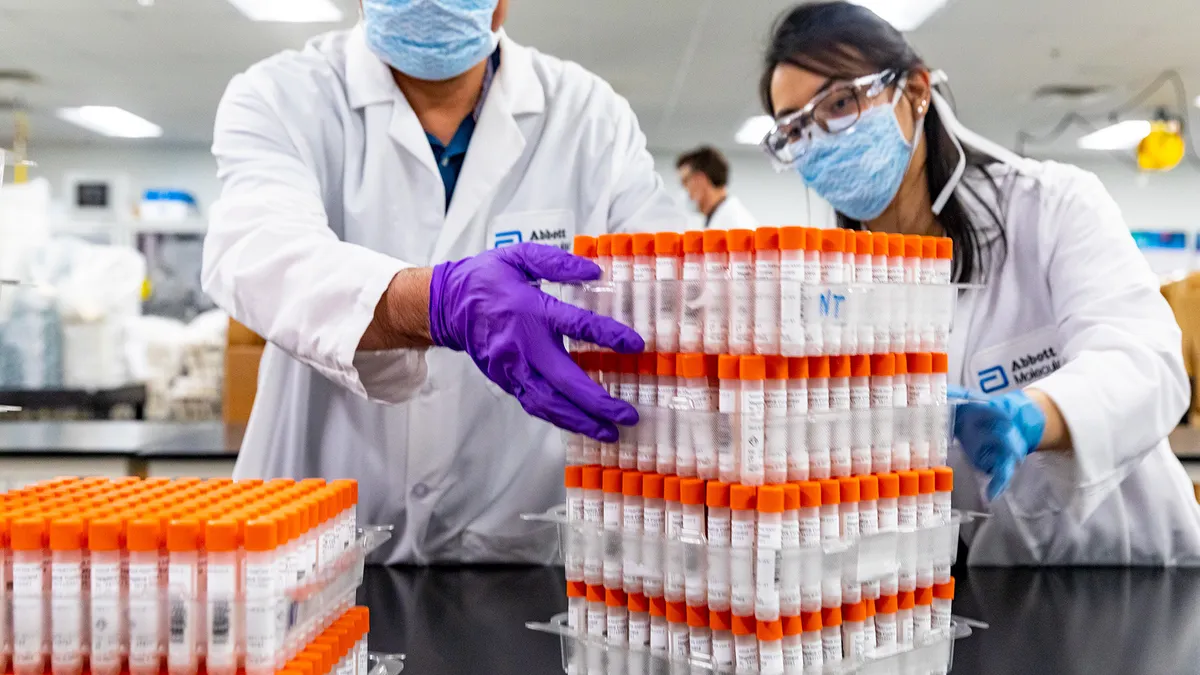Dive Brief:
- University of Texas MD Anderson Cancer Center researchers cautioned in a study published on Friday against the "extensive use" of serology tests from Abbott, Roche and other diagnostics companies that only confirm the presence of certain antibodies and may mislead people to falsely believe they have protection against COVID-19 reinfection.
- While researchers contend the presence of the so-called S-RBD antibody is the best indicator of any potential protection against reinfection, they warned that widely used serological tests confirm only the presence of antibodies to the N-protein.
- Currently, more than 200 commercial and hospital laboratory testing facilities use these N-protein based serology tests for determination of potential COVID-19 immunity, according to researchers. They noted that as of Aug. 5, Abbott has shipped over 13 million serological tests and Roche is expected to produce more than 10 million tests for the U.S. Neither Abbott nor Roche were immediately available for comment regarding the study.
Dive Insight:
The MD Anderson study published in the journal JCI Insight has once again called into question the value of such antibody tests and the inherent risk they may lead people to incorrectly believe they had the virus and may be immune from further infection.
Researchers used SARS-CoV-2 serology assays developed by the Houston cancer center in their study to detect neutralizing antibodies in 138 serial serum samples from confirmed COVID-19 hospitalized patients and 464 healthy and non-COVID-19 serum samples collected between June 2017 and June 2020.
Specifically, researchers measured the levels of binding and neutralizing antibodies against S-RBD and N-protein in the 602 serum samples. In the study, around 3% of the healthy serum samples were positive for N-protein, while only about 1% of the samples were S-RBD positive.
Researchers concluded that "antibody titers against N-protein may suggest prior exposure to SARS-CoV-2 or related viruses, but do not necessarily provide evidence for the presence of neutralizing antibodies." They contend the results of their study are troubling considering the fact that commercial companies have conducted millions of such tests using N-protein.
"We caution against the extensive use of N-protein based serology testing for determination of potential COVID-19 immunity, and we believe that accurate and reliable S-RBD serological testing is needed to carefully identify individuals with neutralizing antibodies in order to help advance recovery efforts around the globe," said senior author Raghu Kalluri, chair of cancer biology at MD Anderson, in a written statement.
Kalluri and co-authors make the case that what's urgently needed are "careful assessments of the prognostic value of SARS-CoV-2 seroconversion and its contribution to potentially conferring immunity." They believe academic institutions such as MD Anderson can offer alterative methods to commercial testing and "enable the development of accurate and reliable serological testing to carefully identify individuals with neutralizing antibodies."
The Abbott Architect i2000 and Roche cobas e 411 analyzer are N-protein-based serological SARS-CoV-2 assays, according to an earlier study comparing six serology tests in the Journal of Clinical Virology. Abbott's COVID-19 antibody test received FDA emergency use authorization in April and Roche's got an EUA in May.
As of August 7, FDA's latest guidance is that a single antibody test is not likely to be sufficiently accurate to make an informed decision regarding whether or not an individual has had a prior infection or truly has COVID-19 antibodies and that a second test, typically one assessing for the presence of antibodies to a different viral protein, would be needed to increase the accuracy of the overall testing results.
"Studies are underway to address questions that will better inform the appropriate use of these tests, such as whether the presence of antibodies conveys a level of immunity that would prevent or reduce the severity of re-infection as well as the duration for which immunity lasts," according to the agency.











